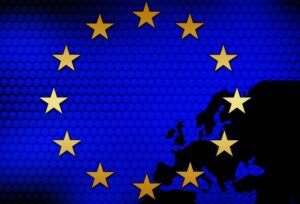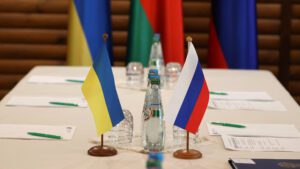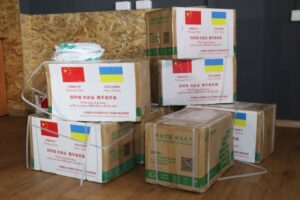
Lithuania’s Seimas has adopted a resolution in which it invited all member states of the European Union to support Ukraine’s aspirations to become a full member of the EU as soon as possible and to agree on granting Ukraine the status of an EU candidate.
“The Lithuanian Seimas unanimously adopted a resolution, which invites all member states of the European Union to support Ukraine’s aspiration to become a full member of the European Union as soon as possible, and to agree on granting the EU candidate status to Ukraine,” the Lithuanian Seimas tweeted on Thursday.
“The Seimas resolution also states that “Ukraine should be subject to an accelerated procedure for accession to the European Union without reservation”,” LRT.LT reports.
“Granting Ukraine the candidate status at this time would be an important sign of moral support for its people, who are defending their homeland and their right to decide their country’s future, without sparing their lives,” the resolution reads.
“The Seimas also maintains that admitting a country whose people have shown “incredible will and determination in their fight for European values” to the European Union “will inspire and strengthen the Union itself”,” it reads.
The resolution notes that Ukraine has been seeking EU membership for more than a decade and that Ukraine and the EU have been bound by the Association Agreement for the past five years. Thus, according to the resolution, Ukraine’s application to join the EU is the result of its strong commitment to European integration.
Also in the resolution, the Lithuanian Seimas confirms its readiness to provide Ukraine with all possible assistance in its quest for EU membership.

The international systems Western Union, MoneyGram, Ria Money Transfer, INTEL EXPRESS and TransferGo have canceled fees for transfers to Ukraine, the press service of the National Bank of Ukraine (NBU) said on Thursday.
According to the announcement, Ria has activated its global donation network for the Save the Children organization to help Ukrainian children who have been affected by the war in Ukraine and their families.
In addition, the INTELEXPRESS international money transfer system can make instant and free transfers to special accounts to raise funds to support the Ukrainian army and humanitarian aid to Ukrainians.
At the same time, the global payment network Euronet, which has an extensive system of ATMs in the world, has abolished fees for its services for the citizens of Ukraine.
In addition, the Polish instant payment system Blik has created a special page for raising funds to help the Armed Forces of Ukraine. The funds will be transferred to the NBU account opened in the state-owned bank – Bank Gospodarstwa Krajowego.
INTEL EXPRESS, MONEYGRAM, RIA MONEY TRANSFER, TRANSFERGO, TRANSFERS, UKRAINE, WESTERN UNION

Estonia simplifies the procedure for obtaining a residence permit for refugees from Ukraine, from March 9, they can apply for a residence permit in one day. The corresponding order was adopted on Tuesday by the government of the republic.
“Today’s government decision will help reduce the bureaucracy for traumatized military refugees from Ukraine. This will allow them to more easily and quickly adapt to life in Estonia,” Prime Minister Kaja Kallas said.
According to the order, a refugee from Ukraine can apply for temporary protection in the form of a residence permit for a year, and then extend this period, the government explained.
Persons under temporary protection, as well as those close to them, are provided with services such as accommodation and meals, health insurance, they are granted the right to work in Estonia, and children are provided with access to pre-school and basic education.
Refugees are entitled to a living allowance, other cash benefits, such as family benefits. All those in need of assistance are entitled to emergency social assistance, they can participate in language learning and adaptation programs free of charge.
Since February 27, more than 7,000 Ukrainians have arrived in Estonia, including 2,610 children. Until now, most of the refugees came to Estonia to stay with their relatives or friends. Earlier it was reported that Estonia is ready to accept up to 10,000 refugees.

Russia’s military offensive against Ukraine led to the destruction of civilian infrastructure and civilian casualties, and forced over 2.011 million people to leave the country in 12 days of war in search of safety, protection and assistance, according to information on the website Office of the United Nations High Commissioner for Human Rights (OHCHR) at 12:00 on Tuesday.
According to it, most of the refugees from Ukraine arrived in Poland, namely 1.204 million people.
Hungary received 191,350 refugees from Ukraine; Slovakia some 140,750; Moldova some 82,760; Romania some 82,060; other European countries some 210,240 people.
According to the UN OHCHR, some 99,300 arrived in Russia from Ukraine, and 450 people arrived in Belarus.
According to the organization, as the situation continues to evolve, about 4 million people may leave Ukraine.
The organization said the right to free movement within the Schengen area means that there are very few border controls in the European Union, so arrival data for Hungary, Poland and Slovakia only reflect border crossings in these countries, but the UN estimates that a large number of people moved to other countries.
In addition, UNHCHR does not take into account persons from border countries who leave Ukraine and return home.

Advisor to the Head of the President’s Office Mykhailo Podoliak said the third round of talks between Ukraine and Russia has ended, there are some positive developments in improving the logistics of humanitarian corridors.
“The third round of negotiations has ended. There are some positive developments in improving the logistics of humanitarian corridors… Intensive consultations have continued on the basic political block of the settlement, along with a ceasefire and security guarantees,” he said on Twitter on Monday evening.

Chinese Red Cross Society will soon provide emergency humanitarian assistance to Ukraine.te Councilor and Foreign Minister Wang Yi made a statement at a press conference at the fifth session of the 13th National People’s Congress (NPC), according to the Embassy of the People’s Republic of China.
Wang Yi said that China considers it important to overcome the crisis by strictly adhering to the purposes and principles of the UN Charter, respecting and safeguarding the sovereignty and territorial integrity of all countries, adhering to the principles of indivisibility of security, taking into account the reasonable security concerns of all sides involved, and settling disputes by exclusively peaceful means through dialogue and negotiations, to form a balanced, effective and sustainable European security mechanism for the sake of lasting peace in the region.
The Chinese minister noted the need for peace and negotiations. China has done some work in this regard and maintains close communication with all sides, he said.
Thus, on the second day after the start of the war, Chinese President Xi Jinping, during a phone conversation with Russian President Vladimir Putin, said that China “would like Russia and Ukraine to agree on peace as soon as possible.”
Wang Yi said that Beijing is ready to continue to play a constructive role in establishing peace and advancing negotiations, the minister also put forward six proposals to prevent a large humanitarian crisis in Ukraine.
According to them, firstly, it is necessary to make efforts to ensure that humanitarian operations comply with the principles of neutrality and impartiality, and also to avoid politicization of humanitarian issues. Secondly, it is necessary to pay attention to all the homeless, both in Ukraine and abroad, as well as to organize work on their accommodation at the proper level. Thirdly, it is necessary to ensure the protection of the civilian population and prevent a secondary humanitarian catastrophe in Ukraine. Fourth, efforts must be made to ensure the safe and unhindered operation of humanitarian assistance, including the provision of prompt, safe and unhindered humanitarian access. Fifth, it is necessary to ensure the safety of foreign citizens in Ukraine, to enable them to leave the country safely and to help them return to their homeland.
Sixth, it is necessary to support the coordinating role of the UN in providing humanitarian assistance to Ukraine and the work of the UN Crisis Coordinator for Ukraine.